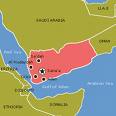Yemen: New Venue For U.S. Geopolitical Great Game
Why Yemen? Is the West choosing a new target?

-[T]he timing for the attacks (or, attempted attacks, or, presumably attempted attacks) was chosen very carefully. The United States face the mid-term elections, and the Democratic administration is heading for a worst defeat in decades. If we look back at a not so distant past, we can remember that a highly resonant terrorist attack is probably the best way to raise the rating of the ruling administration.
-Obama’s administration is looking at a new point of applying its attempts and initiatives. After the obvious failure in Iraq and Afghanistan, they may be looking at Yemen as a new venue of their geopolitical Great Game. The strategic importance of that country is hardly to be over-estimated. The power that controls Yemen, would control the most vital sea routes from Europe to Middle East, South and Southeast Asia.
-Of course, the clock of history cannot be reversed and turned backwards. But learning from the past seems to be very useful. And looking back at the 1980s, we may state that it was the US who, by supporting the mujahedeen forces in Afghanistan, created the Taliban and Al-Qaeda. Now, by violently fighting them in the Middle East, they are turning the whole Muslim world against themselves and their allies.
Last weeks attempted attacks – either at US-bound aircraft or some synagogues somewhere in the US, presumably in Chicago – remain the hottest topic in Western media.
The pure facts run as follows. Last Friday two packages containing explosives were found on cargo planes which initially flew from Sanaa, Yemen, with destination in the US. One package was found in Dubai, the other one in East Midlands Airport near Nottingham, England. Both packages – one carried by UPS, the other one by FedEx – were addressed to synagogues in Chicago. No one has yet claimed responsibility for the attempted attacks, but the security official were very quick in attributing the plot to the Yemeni section of Al-Qaeda.
The incident was followed by intense search of all cargo and passengers’ baggage in several US airports. Also, reports show that 26 more suspicious packages were detained in Yemen. On Saturday, Yemeni officials arrested a 22-year-old woman Hanan al-Samawi, a suspect in the plot. But later on Sunday, she was released on bail after it turned out that someone stole and used her identity card to plant the packages containing explosives.
Meanwhile, the panic has stricken the US and Western Europe. Most countries of the West upgraded the level of terrorist alert. Great Britain even declared a ban on any aircraft that started its flight in Yemen, to k\land on Britain’s territory.
The whole story needs some clarification.
First, why Yemen?
The fact is that the Yemeni authorities have a very poor control over their territory, and definitely have lesser desire to fight international terrorism than their Saudi neighbors. As a result, some notorious figures in the terrorist movement have found a safe haven in Yemen, especially after Afghanistan and Pakistan ceased to be such as a result of constant military activities.
Second, why now, and why Chicago?
Actually, the timing for the attacks (or, attempted attacks, or, presumably attempted attacks) was chosen very carefully. The United States face the mid-term elections, and the Democratic administration is heading for a worst defeat in decades. If we look back at a not so distant past, we can remember that a highly resonant terrorist attack is probably the best way to raise the rating of the ruling administration. And an attack uncovered before it was executed gives additional points to the authorities. So, whatever the real motives of the terrorists, the whole uncovered plot is designed to give Barack Obama and the Democrats a couple of points due to ‘voting out of compassion’. The fact that the explosives were addressed to synagogues in Chicago (Obama’s native town) speaks for itself.
Then, what follows next?
A most obvious answer would be that Obama’s administration is looking at a new point of applying its attempts and initiatives. After the obvious failure in Iraq and Afghanistan, they may be looking at Yemen as a new venue of their geopolitical Great Game. The strategic importance of that country is hardly to be over-estimated. The power that controls Yemen, would control the most vital sea routes from Europe to Middle East, South and Southeast Asia. At the moment, if anyone controls this vital region are the Somali pirates. For the US, taking hold of a territory there with prospects of building its military bases, would mean a return to the scene that, due to the failures of the recent one or two decades, seems at present lost.
But then, there is another and probably most crucial question. What means the US is ready to use against a force that from the very beginning was a pure US invention, i.e. Al-Qaeda?
By now, military measures have proved their complete futility, both in Iraq and Afghanistan. More so, if Yemen has really become a safe haven for extremists, it is due only to the American-led invasion of those two countries. So, a military operation against Yemen may result only in one thing: Al-Qaeda will shift its operations to another area, and hence, the seeds of terrorism will be further disseminated.
Of course, the clock of history cannot be reversed and turned backwards. But learning from the past seems to be very useful. And looking back at the 1980s, we may state that it was the US who, by supporting the mujahedeen forces in Afghanistan, created the Taliban and Al-Qaeda. Now, by violently fighting them in the Middle East, they are turning the whole Muslim world against themselves and their allies. What will they achieve by spreading their military activities to yet another area in that volatile region, is a question, the answer to which hardly anyone would like to hear.

